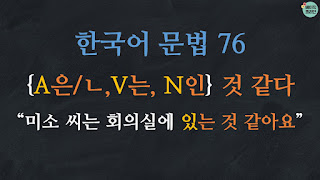Learn Korean: Korean Grammar 121: N이나/나 (2)
In this lesson, we're going to learn 'N이나/나'
🎬 한국어 문법 강의 121: https://youtu.be/aOPOETSsIlY
1. A short conversation
- 미소: 나나 씨는 책을 좋아하나 봐요. 한 달에 몇 권 정도 읽어요?
(I think you like reading books. How many books do you read per month?)
- 나나: 한 열 권 정도 읽는 것 같아요.
(I think I read around 10 books.)
- 미소: 열 권이나 읽어요? 저는 한 달에 한 권도 안 읽는데, 정말 많이 읽네요.
(Do you read 10 books? I don't read even one book a month, but you read a lot.)
→ The grammar we're going to learn today is '열 권이나.'
2. Usage
- '(이)나' attaches after a noun that indicates quantity or quality.
- It's a postpositional particle used to indicate that the amount of something is larger than expected or to emphasize a large amount.
3. Example Sentences
✎ 미소: 한 달에 책을 열 권이나 읽어요? (열 권 + 이나)
(Do you read ten books a month?)
- '열 권이나' comes from the combination of the noun '열 권' and '이나.'
- Miso reads one book a month. On the other hand, Nana reads ten books a month.
- By Miso's standards, Nana reads a lot of books.
- At this time, you can use '이나' after the noun '열 권' to say that the number is larger than you expect. ‘열 권이나’
✎ 미소: 배가 고파서 햄버거를 다섯 개나 먹었어요. (다섯 개 + 나)
(I was hungry so I ate 5 burgers.)
- '다섯 개나' comes from the combination of the noun '다섯 개' and '나.'
- Miso usually eats only one hamburger. But today, she was really hungry. So she ate 5 burgers. She eats more than usual.
- At this time, you can use '나' after the noun '다섯 개' to say that the number is larger than the number that you normally eat. '다섯 개나'
4. Comparison: N이나/나 vs N밖에
- Let's compare 'Noun(이)나' to 'Noun밖에'.
- Depending on the speaker, both expressions '(이)나' or '밖에' can be used to say the same amount.
1) N이나/나: '(이)나' is used to say that a certain quantity is more than expected.
- 물이 반이나 남았어요. (Half the water's left.)
2) N밖에: is used to say that a certain quantity is less than expected.
- 물이 반밖에 안 남았어요. (There is only half water left.)
- If the speaker thinks that the same amount is bigger than expected, use '이나.'
- If the speaker thinks that the same amount is smaller than expected, use '밖에.'
5. Combination Information
- It attaches after a noun.
(1) Final Consonant O: 이나
- When the preceding noun has the final consonant, '이나' is used.
- 열 번 + 이나 → 열 번이나
- 열 명 + 이나 → 열 명이나
(2) 받침 X: 나
- On the other hand, when the preceding noun does not have the final consonant, '나' is used.
- 열 개 + 나 → 열 개나
- 열 마리 + 나 → 열 마리나
6. Practice
✎ 나나 씨는 강아지를 다섯 마리나 키워요. (다섯 마리 + 나)
(Nana has five puppies.)
- '다섯 마리나' is an expression that combines '나' after the noun '다섯 마리'.
✎ 커피 한 잔에 15000원이나 해요? (15000원 + 이나)
(Is it really 15,000 won for a cup of coffee?)
- ‘15,000원이나’ is the combination of the noun '15,000원' and '이나'.
✎ 집에서 학교까지 버스로 두 시간이나 걸려요. (두 시간 + 이나)
(It takes two hours from home to school by bus.)
- ‘두 시간이나’ is the combination of the noun '두 시간' and '이나'.
(A short conversation)
- 미소: 나나 씨, 한국어 시험 잘 봤어요?
(Nana, did you take a Korean exam well?)
- 나나: 아니요. 실수해서 세 개나 틀렸어요.
(No. I made a mistake so I got three wrong.)
- 미소: 세 개밖에 안 틀렸어요? 시험 잘 봤네요.
(Did you only get three wrong? You did well on your test.)
→ 세 개나 (세 개 + 나)
- '세 개나' is a combination of the noun '세 개' and '나.'
- Nana thinks that 'three' is more than expected.
- So she says '세 개나.'
→ 세 개밖에 (세 개 + 밖에)
- On the other hand, Mis thinks that 'three' is less than expected.
- So she says '세 개밖에.'
- Even though 'three' is the same, their perspectives differ.
Thank you!
#베이직코리안 #한국어문법 #Basickorean #Koreangrammar #이나 #나
_basickorean.jpg)

